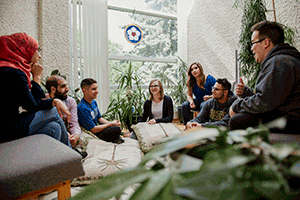Ready to learn more?
Get all the details straight to your inbox!

Luther College appeals to students who want to study in a safe, nurturing, and inclusive environment. We welcome students of all faiths, ethnicities, backgrounds, religions, genders, and sexual orientations.

Luther College is a great choice for high school to university transition. Enjoy all the benefits of a larger campus, without feeling lost in the crowd. Our community is full of caring mentors and peers to ensure a positive student experience.

Luther College offers Bundles programs that group together first-year students and classes to give you a great start and help ease the transition from high school to university.

The priority deadline for academic application is March 15. To book a personalized enrolment counselling appointment, contact our Recruitment Office at 1-306-206-2117.

Living in The Student Village at Luther College, our student residence, comes with a choice of healthy, nutritious meal plans. That means no grocery shopping, no meals to cook, and no dirty dishes to worry about. You can focus on your studies and wellness!

Luther College students are eligible for nearly $100,000 in academic awards – in addition to scholarships and bursaries awarded by the U of R.

Our student residence, The Student Village at Luther College, welcomes residents from ALL post-secondary institutions in Regina. Rooms come with a meal plan, free laundry, free wi-fi, and a great sense of community.

Eating better means studying better. The Luther Cafeteria offers fresh, healthy, nutritious meals seven days a week with a self-serve “all-you-care-to-eat” concept students prefer.
Get all the details straight to your inbox!
Scriptural Sodom is a necessary battleground for queer believers of all the Abrahamic traditions (Shannahan, 676).
What is the position of Islam on homosexuality? A quick search through Muslim sources renders the answer that homosexuality is overwhelmingly considered haram or forbidden. For example, a classic 14th century manual of Islamic jurisprudence, Ahmad ibn Naqib al-Misri’s “Umdat al-Salik (Reliance of the Traveller) states that:
In more than one place in the Holy Koran, Allah recounts to us the story of Lot’s people, and how He destroyed them for their wicked practice. There is consensus among both Muslims and the followers of all other religions that sodomy is an enormity. It is even viler and uglier than adultery (664).
The influential contemporary Egyptian Muslim scholar Yusuf al-Qaradawi, in his popular book Al-Halal wal-Haram fil Islam (The Lawful and the Prohibited in Islam), describes homosexuality as a “sexual deviation” and “abominable practice”, arguing that:
The story of the prophet Lut (Lot) as narrated in the Qur’an should be sufficient for us. Lut’s people were addicted to this shameless depravity, abandoning natural, pure, lawful relations with women in the pursuit of this unnatural, foul and illicit practice (169).
These proscriptions against homosexuality are all rooted in the story of Lot as it is presented in the Qur’an. Likewise, the story of Lot and the cities of Sodom and Gemorrah in Genesis 19 in the Christian and Jewish scriptures also figures prominently in traditional Christian heteronormative discourses that attack homosexuality as depravity. Furthermore, just as the story of Lot in the Qur’an led to the invention of the Arabic word liwat (shorthand for the “the act of the people of Lot” meaning male anal intercourse), so also the story in the Bible gave rise to the term “sodomy” (shorthand for the “act of the people of Sodom” again meaning male anal intercourse). These new non-qur’anic and non-biblical terms were then read back into the story of Lot to signify that it was primarily about the condemnation of these acts.
However, recently, those who argue for the continuation of a heteronormative standard in the Christian church, have more-or-less discontinued their appeal to the story of Lot and Sodom, instead focusing on other biblical texts such as Leviticus and the writings of Paul (eg Jordan, 194-5, Hays, 5; but see Gagnon, 71). Exegetical work on the story has increasingly shown that the sin of the “Sodomites” is not homosexuality as it is understood today, that is as consensual non-heterosexual relations, but rather concerns the aggressive abuse of strangers via anal rape (eg Bellis & Hufford, 97, Helminiak, 46-47). Since the story of Lot figures so prominently in Muslim discourse about homosexuality, the question can be raised whether Muslim exegesis of this story has also generated alternate interpretations that undermine the use of the story in religious condemnations of homosexuality. In what follows, one such instance will be briefly described.
The story of Lot is told or alluded to in at least 14 chapters or suras of the Qur’an, indicating its importance; here are three examples:
| Qur’an The Heights 7:80-84
(translation by Abdel Haleem) (80)We sent Lot and he said to his people, ‘How can you practice this outrage? No one in the world has outdone you in this. (81)You lust after men rather than women! You transgress all bounds!’ (82)The only response his people gave was to say [to one another], ‘Drive them out of your town! These men want to keep themselves chaste!’ (83)We saved him and his kinfolk —apart from his wife who stayed behind—(84)and We showered upon [the rest of] them a rain [of destruction]. See the fate of the evildoers.
|
Qur’an Hud 11:77-83
(translation by Abdel Haleem) (77)And when Our messengers came to Lot, he was anxious for them, feeling powerless to protect them, and said, ‘This is a truly terrible day!’ (78)His people came rushing towards him; they used to commit foul deeds. He said, ‘My people, here are my daughters, They are more wholesome for you, so have some fear of God and do not disgrace me with my guests. Is there not a single right-minded man among you?’ (79)They said, ‘You know very well what we want.’ (80)He said, ‘If only I had the strength to stop you or could rely on strong support!’ (81)They [the messengers] said, ‘Lot, we are your Lord’s messengers. They will not reach you. Leave with your household in the dead of night, and let none of you turn back. Only your wife will suffer the fate that befalls the others. Their appointed time is the morning: is the morning not near?’ (82)And so when what We had ordained come about, We turned their town upside down and rained down stones of baked clay on it, layer upon layer, (83)marked from your Lord. It is not far from the evildoers. |
Qur’an The Poets 26:160-175
(translation by Abdel Haleem) (160)The people of Lot, too, called the messengers liars. (161)Their brother Lot said to them, ‘Will you not be mindful of God? (162)I am a faithful messenger to you: (163)be mindful of God and obey me. (164)I ask no reward from you, for my only reward is with the Lord of the Worlds. (165)Must you, unlike [other] people, lust after males (166)and abandon the wives that God has created for you? You are exceeding all bounds,’ (167)but they replied, ‘Lot! If you do not stop this, you will be driven away.’ (168)So he said, ‘I loathe what you do: (169)Lord, save me and my family from what they are doing.’ (170)We saved him and all his family, (171)except for an old woman who stayed behind, (172)then We destroyed the others, (173)and poured a rain of destruction down upon them. How dreadful that rain was for those who had been forewarned! (174)There truly is a sign in this, though most of them will not believe: (175)your Lord alone is the Almighty, the Merciful. |
While narrated somewhat differently each time, the general outline of the qur’anic story can be discerned. Like the biblical version, Lot receives divine visitors who are threatened by the townsmen, Lot and (some of) his family are saved, and collective and individual destruction ensues (Loader, 35). To these three stages in the plot, the Qur’an prefixes a portrayal of Lot’s preaching to his people. Lot’s preaching, not found in the biblical account, serves as the occasion where the qur’anic story seems to explicitly foreground homosexual inclinations as the cause of God’s judgement and destruction. Nothing as explicit as this appears in the biblical account. And so it would seem that a non-heteronormative reading of the qur’anic narrative will prove much more difficult than similar efforts with the biblical story. And yet such readings and interpretations are emerging. Here we will briefly consider the efforts of Scott Siraj al-Haqq Kugle, an American Muslim scholar who in 2010 published a book-length critical examination of the issue of homosexuality in Islam.
Kugle grounds his approach to the Qur’an’s story of Lot, on the one hand, in a liberation theology perspective developed by South African Muslims (eg Esack), which insists that the central principle of the Qur’an is “striving for justice in solidarity with the oppressed” (Kugle, 35), and, on the other, in the Qur’an’s positive endorsement of diversity, which he is inclusive of sexual diversity. He thus argues that the story of Lot cannot be read in isolation but must be considered in the context of the Qur’an as a whole. Therefore, terms in the story, such as shahwa (“desire”) and fahisha (“abomination”), which are traditionally interpreted narrowly as exclusive references to same-sex acts, are shown to have far wider sexual and non-sexual connotations in their overall usage in the Qur’an (see also Jamal). Instead of singularly focussing on same-sex acts,
. . . the story is really about infidelity and how the Tribe of Lot schemed for ways to reject his Prophethood and his public standing in the community. . . They rejected him in a variety of ways, and their sexual assault of his guests was only one expression of their inner intention to deny Lot the dignity of being a Prophet and drive him from their cities (Kugle, 51, 52)
The story of Lot does not address homosexuality or same sex acts in general, but, insofar as it condemns any sexual act, it condemns male anal rape of men. Furthermore, the rapists in the story are depicted otherwise as heterosexuals, that is, as men who have wives (Qur’an 26:165-66); “. . . it appears that the men of Lot’s Tribe were actually heterosexual men attempting to aggressively assert their power against other vulnerable men” (Kugle, 54).
There is much more to Kugle’s interpretation which this brief treatment is not able to cover, but of interest is that the conclusion he reaches is substantially similar to the conclusions reached by interpreters of the biblical story of Lot, namely, that the sins of the people of Sodom were wide ranging, and insofar as any of them were specifically sexual, they concerned not homosexual inclinations or acts in general, but rather specifically male anal rape of men, a transgression of hospitality and a common technique of shaming and emasculation used by heterosexual men against other men. The story thus leaves open the question of what Muslim, Christian or Jewish religious communities today are to do with LGBTIQ folk who do not resemble Lot’s people.
But both these Muslim and Christian interpretations that claim to be liberating for LGBTIQ believers contain a troubling gap: they do not sufficiently account for the treatment of women in the story. Both the biblical and qur’anic versions of the story have Lot offering his own daughters to the mob, and both versions narrate that Lot’s wife (or an old woman) was destroyed in the end along with the wicked people of Sodom. For Kugle, the destruction of Lot’s wife is another indication that the sin of the people could not have been male homosexuality but rather a wider immorality, “the network of idolatry and exploitation that characterized the city’s population, including women and children” (Kugle, 55). And Lot’s offer of his daughters to the mob he interprets as a sarcastic comparison; that is, Lot was not serious about the offer but meant to shock the townspeople into the realisation that their intended violation of his guests was as bad as, if not worse, than a violation of his daughters.
Given the patriarchal substrate of both the Qur’an and Bible – both scriptures are overwhelmingly addressed to males (although the Qur’an uniquely addresses women specifically in places) – these explanations are not entirely convincing. If the story of Lot does not address the modern issue of the morality of consensual same sex acts neither does it measure up to the modern view of consensual heterosexual acts. Consent is a male privilege in the ancient contexts from which these scriptural stories come, and women were conceptualised as dependent subjects of men rather than independent agents. Thus Lot is able to offer up his daughters without any indication that their consent mattered. As Muslim scholar Kecia Ali comments on the Qur’an’s condemnation of the actions of Lot’s townspeople:
The argument that the Qur’an objects not because the men in question sought same-sex intimacy but rather because they intended non-consensual violation rests on an assumption that consent is necessary for an ethical or lawful sexual relationship. However, elsewhere in the Qur’anic text, as with female captives (“what your right hands possess”), consent is not always relevant to the formation of licit sexual relationships (83).
Lot’s wife is destroyed along with the townspeople; her identity, as also the identity of the other women and children of the town – that is, the dependent non-adult male characters (whom she may be representing on a literary level) – is submerged under the actions of the adult males who threaten Lot’s guests. Her voice, as also the voice of her daughters and the voices of the other women and children of town, remains unheard in the non-heteronormative reading of the story reported in this article. As Muslim scholar Amina Wadud remarks, the danger of a non-heteronormative reading is that it “challenges patriarchal heterosexual privilege while rescripting the privilege of male sexuality” (271). If the fate of the women of Sodom, due to the behaviour of the men, is the “collateral damage” in the war against homosexuality in heteronormative readings of the story (Toensing), it is troubling that their fate similarly seems to be the “collateral damage” in the war against heteronormativity in LGBTIQ-friendly interpretations (Shannahan, 679).
It seems to me that Muslims, Christians and Jews have much they can do together to improve non-heteronormative interpretations of scriptural texts such as the story of Lot in the service of a liberation theology for LGBTIQ believers such that these interpretations do not end up reinscribing male privilege.
Abdel Haleem, M. A. S. (trans) (2005) The Qur’an. Oxford: Oxford University Press.
Ali, Kecia (2006) Sexual Ethics and Islam. Oxford: Oneworld Publications.
Bellis, Alice Ogden & Terry L. Hufford (2002) Science, Scriptur and Homosexuality. Cleveland: The Pilgrim Press.
Esack, Farid (1997) Qur'an, Liberation and Pluralism: an Islamic perspective of interreligious solidarity against oppression. Oxford: Oneworld Publications.
Gagnon, Robert A. J. (2001) The Bible and Homosexual Practice: Texts and Hermeneutics. Nashville: Abingdon Press.
Hays, Richard B. (1994) “Awaiting the Redemption of Our Bodies: The Witness of Scripture Concerning Homosexuality”, in Homosexuality in the Church: Both Sides of the Debate, ed. J. Siker. Louisville: Westminster John Knox. 3-17.
Helminiak, Daniel A. (1994) What the Bible Really Says About Homosexuality (updates & expanded). New Mexico: Alamo Square Press.
Kugle, Scott Siraj al-Haqq (2010) Homosexuality in Islam: Critical Reflections on Gay, Lesbian, and Transgender Muslims. Oxford: Oneworld Publications.
Jamal, Amreen (2001) “The Story of Lot and the Qur’ān’s Perception of the Morality of Same-sex Sexuality”, Journal of Homosexuality 41.1: 1-88.
Jordan, Mark D. (2011) Recruiting Young Love: How Christians Talk About Homosexuality. Chicago/London: The University of Chicago Press.
Loader, J.A. (1990) A Tale of Two Cities: Sodom and Gemorrah in the Old Testament, early Jewish and early Christian traditions. Kampen: J.H. Kok.
Al-Misri, Ahmad ibn Naqib (1994) Reliance of the Traveller, trans. Nuh Ha Mim Keller, rev. ed. Beltsville, Maryland: Amana Publications.
Al-Qaradawi, Yusuf (1989) The Lawful and the Prohibited in Islam, trans. Kamal El-Helbawy, M. Moinuddin Siddiqui & Syed Shukry, 2nd ed. Salimiah, Kuwait: International Islamic Federation of Student Organizations.
Shannahan, Dervla Sara (2010) “Some queer questions from a Muslim perspective”, Sexualities 13.6: 671-684.
Toensing, H. J. (2005) “Women of Sodom and Gemorrah: Collateral damage in the war against homosexuality?”, Journal of Feminist Studies in Religion 21.2: 61-74.
Wadud, Amina (2006) Inside the Gender Jihad: Women’s Reform in Islam. Oxford: Oneword Publications.